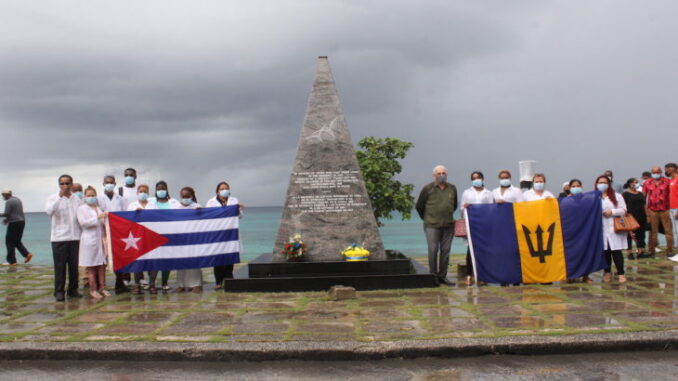
Cuban nurses to stay longer
The Cuban health professionals that have been in Barbados helping the country in its COVID-19 fight will be here longer than initially planned.
Barbados’ Ambassador to CARICOM David Comissiong indicated that Government has extended the stay of the 65 Cuban nurses assigned to the Harrison Point Isolation Centre for a period of half a year.
Barbados TODAY understands that the health team which arrived on April 5 was scheduled to leave at the end of this month.
Delivering remarks during the 44th Commemoration of the Cubana Airlines Tragedy at the Cubana Monument, Paynes Bay, St James, Comissiong said: “The Government of Barbados will continue to draw upon this assistance and will therefore extend the services of the Cuban healthcare workers, some of whom are here amongst us this morning, for an additional six months.”
Ambassador of the Republic of Cuba Sergio Jorge Pastrana, also speaking at the event, confirmed that the agreement was signed between Cuban and Barbadian authorities on Monday to extend the stay of the medical team.
“With their help, Barbados will be able to cope with the occurrence of new imported cases of infected travellers coming from abroad and thus be able to control any contagion that is recognised through tracing and isolation in such a way as to avoid the occurrence of any local community spread of the virus.
“So, in this way, with the control over diseases, and as the direct opposite of that spread of hate and terror, with the spread of knowledge and health, with training and care, with teaching and love, we can fulfill our duty of honouring them [those who died in the crash].
“It must be our commitment to oppose all of that to the hate and division that those criminals continue to spread among us. Let us turn that practise of love and care into our best homage to those who were robbed of their share of creative life and work so cruelly on that morning, 44 years ago,” Ambassador Pastrana added.
Meanwhile, Ambassador Comissiong noted that the COVID-19 crisis has forced heads of nations to recognise that it is only through collective action that they would be able to make the difference.
In this regard, he said, Cuba has led the way and CARICOM owes that nation a great debt of gratitude for the invaluable assistance rendered through the provision of much-needed healthcare workers to respond to COVID-19 in the region.
He also noted that Barbados and Cuba shared heritage and interests within the region and the common challenges that “we face as small island developing states have all served as the foundation of our bilateral relationship”.
Comissiong added that since 1972, Barbados has been an ardent supporter of the lifting of the United States economic commercial blockade against Cuba. He reminded those gathered at the monument that in that same year, Prime Minister Errol Barrow of Barbados, President Forbes Burnham of Guyana, Prime Minister Michael Manley of Jamaica, and Prime Minister Eric Williams of Trinidad and Tobago took the audacious and principled step of extending diplomatic and other recognition to the Republic of Cuba, in defiance of the policy of isolation with which Cuba had been targeted by the US and the Organization of American States (OAS).
He said Barrow was always clear in his constant assertion that the Caribbean is a civilisation and should be manifested in bonds of unity.
“Prime Minister Mia Amor Mottley expressed a similar notion, but in a more down-to-earth and easy-to-grasp formulation, at the CARICOM Heads of Government Intersessional Conference that was held in Barbados in February of this year when she declared that ‘we are family’. Prime Minister Mottley also went on to posit that in light of the fact that we are family, we must never permit anyone or anything to come from outside the family and divide us,” Comissiong recalled.
Cuban healthcare workers joined diplomats and officials at the Cubana Monument that was erected to honour the victims of the bombing of the Cubana-455 flight to Barbados on October 6, 1976, while on its return route to Havana.
The average age of the 73 lives on board that day was just 30 years. Most of them were youngsters in the prime of life with many aspirations towards their respective achievements in study, work, and sports. Among the victims were young Guyanese students who were going to start their careers as medical doctors, the young Cuban fencing team that had won all medals at the regional competition, young Korean diplomats, and the flight crew.
Anesta Henry


